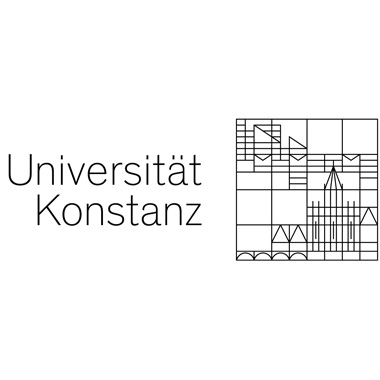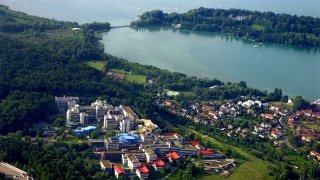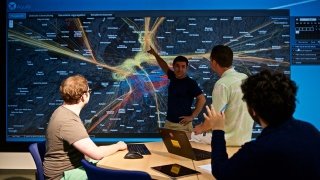Kurzbeschreibung
The Department of Computer and Information Science maintains a well established research profile: “Explorative Analysis and Interactive Visualisation of Complex Models and Large Data Spaces”. This shared profile is reflected in the research and research-driven teaching of our working groups.
The international Master's programme in Computer and Information Science is designed to be two years of full-time study (four semesters). The language of instruction is English. An application can be submitted for both the winter and summer semesters. The programme is a classroom-based study programme.
This master's programme addresses: BSc graduates with a three-year bachelor’s degree in Computer Science or another relevant subject; completed BSc credits: 180 ECTS.
Vollzeitstudium
Study structure
The structure of the master's programme provides for specialisation and is based on different module areas such as the basic module area, advanced module area, supplementary area and final part of study. A total of 120 ECTS credits must be achieved. 90 ECTS credits are fixed and clearly assigned to the different module areas. Another 30 ECTS credits can be distributed among the different areas. In each module area students can choose from a pool of different modules/courses according to their own preferences.
Basic module area (24 to 54 ECTS credits)
- a minimum of four and a maximum of nine basic modules (6 ECTS) from the Computer Science Department
Advanced module area (36 to 66 ECTS credits)
- modules in the range of 36 to 66 ECTS credits, comprising a Master's seminar (3 ECTS), a Master's project (9 ECTS) and 24 to 54 ECTS credits from the “Master” advanced modules with a total of 6 or 9 ECTS credits each
Supplementary area (0 to 18 ECTS credits)
- interdisciplinary courses or courses of other subjects up to a maximum of 18 ECTS credits
Final part of study (30 ECTS credits)
- master's thesis and master's colloquium
Admission criteria
Admission to the Master's program is decided by the Master's Admission Committee, consisting of professors from our department. The Master Admission Committee is guided by defined admission criteria and uses a point system for assessment. Criteria such as the final grade, subject relevance, motivation and additional subject-related activities such as internships, study abroad or work experience and/or special subject-related commitments are assessed and evaluated.
The points system however cannot compensate for a lack of subject relevance. In addition, applicants must prove English proficiency at a high level B2 (CEFR). The department has listed on its website which test formats are accepted.
Programming skills
A solid knowledge of the principles and practice of software engineering and programming is required. Students need to be able to read, understand, and write high-quality code in a modern, object-oriented language such as Java or C++, which are among the most frequently used programming languages at the department. For some advanced courses, you also need to have the willingness to learn and work with other programming languages that are used for data analysis and visualisation, such as Python.
Our departmental admission committee decides on the basis of the application documents and a points system on the applicant’s eligibility for the master’s programme in Computer and Information Science. We recommend to apply with a degree in Computer Science or a very closely related subject from a recognized higher education institution.
The Department of Computer and Information Science maintains a well established research profile: “Explorative Analysis and Interactive Visualisation of Complex Models and Large Data Spaces”. This shared profile is reflected in the research and research-driven teaching of our working groups, who specialise in different application areas such as data science, cyber-physical systems, health, network science or software certification.
While studying towards your international master's degree, you can choose to specialise in the following areas:
- Data Science
- Visual computing
- Interactive Systems
- Software and Systems
- Algorithmics
or you can shape your own profile. Our master's programme includes interdisciplinary and practical elements to help you gain as broad an understanding of the subject as possible. There is also the possibility of integrating a study abroad period.
- M.Sc Computer and Information Science
- Joint research focus and fields of specialisation
- Mentoring programme
- Practical work experience
- Study abroad
Study programme objective and future career
A Master's programme in Computer and Information Science provides students with the opportunity to specialise in a particular area of computer or information science, especially with regard to topics pertaining to the exploration of large volumes of data (data science), visualisation (visual computing), and human-computer interaction.
Graduates will be able to apply and further develop practical methods of computer and information science across different sectors. Graduates with this profile will find jobs in all areas and sectors of national and international organisations and companies.
Graduates who have successfully completed the master's programme in Computer and Information Science pursue careers as
- data scientists and data analysts
- software developers and consultants
- system designers and engineers
- interaction designers and usability engineers
in fields where large volumes of data are processed and visualized, such as
- banking and insurance businesses
- telematics and internet agencies
- software companies
- movies, simulation and the computer games industry
- market research, management consultations,
- logistics and network management
- medicine and molecular biology
Quelle: Bela Gipp, FB Inf, UKN

Joint research focus and fields of specialization
The master's programme takes on the research of our research groups, especially in the mentioned area of exploratory analysis and visualisation of large information spaces. This kind of departmental and interdisciplinary joint research is unique in Germany and highly acknowledged internationally. The Master's programme has a strong research orientation and an emphasis towards research-driven teaching. Furthermore, it provides exciting opportunities for specialisation:
Study profiles
To help you with setting up an individual study plan, we have established a range of pre-defined specializations. In these specializations, we have collected a range of modules which fit together thematically and allow you to become a specialist in one of these fields:
- Data Science
- Interactive Systems
- Visual Computing
- Software and Systems
- Algorithmics
Mentoring programme
Master's students are guided and mentored by a university professor during the Master's programme. A mentor will help students to structure their studies and will be chosen according to the field of specialisation at the beginning of the master's programme.
Practical work experience
Master's programmes at German universities generally do not have an integrated practical internship period. However, it has become quite common in our master's programme for students to take a leave of absence in the second semester to do an industrial internship. A leave of absence does not extend the duration of studies. Tuition fees are suspended. In addition, it is quite common meanwhile that final theses can also be written in cooperation with a company. The Department of Computer Science encourages student initiatives to gain practical work experience and supports students in implementing them.
Study abroad
The Department of Computer and Information Science supports student mobility and therefore maintains and establishes new exchange agreements at all degree levels with a variety of partner universities in Europe and overseas. Although a semester abroad is not mandatory, we encourage our master’s students to participate in a study and/or work exchange programme.
As a rule, students use the second semester to go abroad. Alternatively, it is also possible to write the final thesis in the fourth semester at one of our partner institutes abroad.

Du hast Fragen zum Studiengang? Deine Nachricht wird direkt an die Studienberatung weitergeleitet.
Selbstständiges Arbeiten gelernt
Vielseitige Kurse, oft leider etwas zu theoretisch. Allerdings breite Auswahl an Interessengebieten mit Möglichkeiten auch in der Forschung aktiv zu werden. Man wird mit vielen Challenges und Projekten konfrontiert, die man meist selbstständig ohne viel Instruktion meistern muss, wodurch man jedoch auch am meisten lernt.
Sowohl wichtige, als auch weiterführende Materialien gibt es immer online zur Verfügung.
Man kann sich für alles online registrieren.
Per Mail oder Zoom sind die allermeisten Profs erreichbar.
Gut und divers aufgestellter Lehrstuhl
Der Lehrstuhl ist gut aufgestellt. Es gibt Möglichkeiten, sich in fast alle der verschiedenen Teilbereiche zu vertiefen und diese kennen zu lernen. Die Professoren sind nett und offen für die Anliegen der Studenten. Für Studenten gibt es über die Fachschaft viele Angebote, sich zu vernetzen.
Top Uni am Bodensee
Moderne Uni direkt am Bodensee mit super Profs und interessanten Vorlesungen. Insbesondere das Uni Leben abseits der Vorlesungen, also die Fachschaften und Veranstaltungen sind hier super organisiert. Würde mich jederzeit wieder für die Uni Konstanz entscheiden.
Weiterempfehlungsrate
- 100% empfehlen den Studiengang weiter
- 0% empfehlen den Studiengang nicht weiter
Standorte
-
Standort Konstanz
Uni Konstanz
Universitätsstraße 10
78457 Konstanz
Vollzeitstudium







